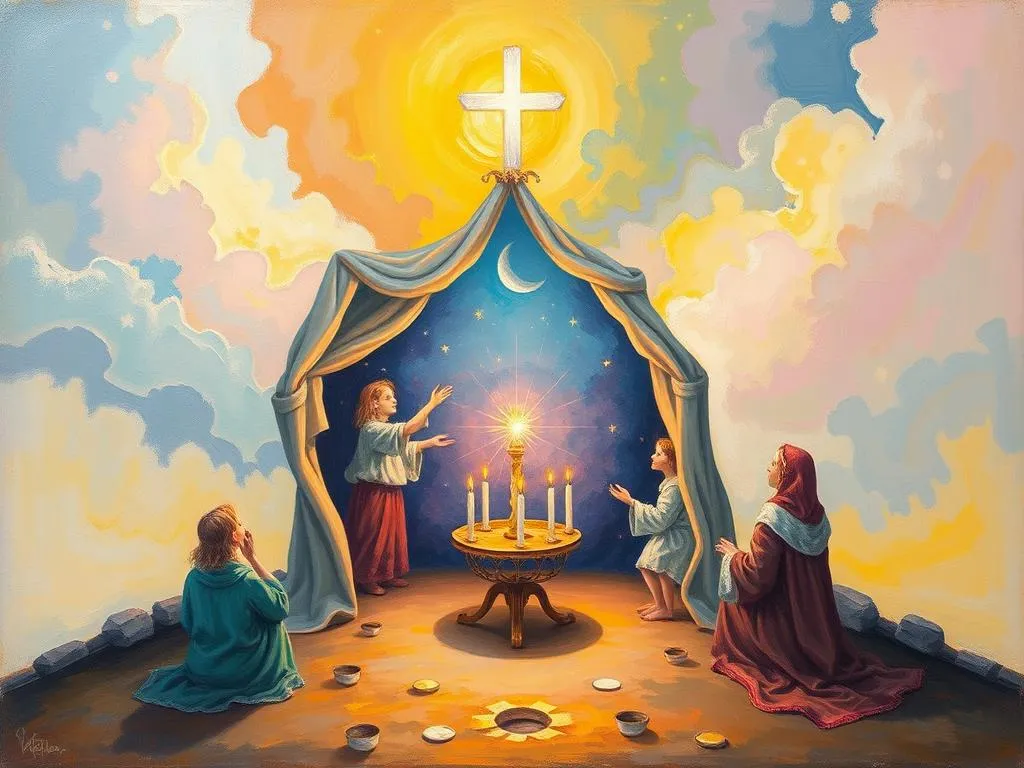
Introduction
Dreams have long fascinated humanity, serving as windows into our subconscious minds and sources of profound insights. One particularly intriguing dream symbol is Passover, which evokes a rich tapestry of meanings tied to cultural, spiritual, and personal themes. The significance of Passover in dreams often transcends its historical context, inviting individuals to explore their personal narratives and spiritual journeys. This article delves into the multifaceted symbolism of Passover within dreams, unveiling hidden insights and spiritual meanings that may resonate deeply with dreamers.
Symbolism and Meaning
The symbolism of Passover in dreams is multifaceted, touching upon themes of liberation, renewal, and transformation. Traditionally, Passover commemorates the Israelites’ escape from slavery in Egypt, symbolizing freedom and the promise of a new beginning. When Passover appears in your dreams, it may signify a longing for release from constraints or a desire to break free from toxic patterns in your waking life.
One of the most prominent symbols associated with Passover is the seder plate, which contains various symbolic foods representing different aspects of the Passover story. In dreams, encountering a seder plate can reflect a need to address unresolved issues or confront painful memories, urging the dreamer to process their past for emotional healing. Each item on the plate, such as bitter herbs or charoset, may represent specific challenges or experiences the dreamer must confront.
Another significant symbol is the matzah, unleavened bread that represents humility and the struggle for freedom. Dreaming of matzah could indicate a period of hardship or sacrifice, suggesting that the dreamer is currently facing challenges that require resilience. It may also symbolize the idea of embracing simplicity and letting go of material attachments, encouraging the dreamer to focus on spiritual growth.
Moreover, ritual plays a crucial role in the Passover experience. If you dream about participating in a Passover ritual, it may signify a desire for connection—either with your roots, your community, or a deeper part of yourself. This aspect of the dream might indicate that you are seeking to return to your origins or searching for a sense of belonging in your life.
From a psychological perspective, Passover in dreams can also reflect the struggle for identity. As the Israelites sought their place in the world, so too may the dreamer be seeking clarity about their own identity and purpose. This aspect invites the dreamer to explore unanswered questions about who they are and what they stand for, potentially leading to a more profound understanding of their values and beliefs.
Key Scenarios and Variations
The interpretation of Passover dreams can vary significantly depending on the specific scenarios and elements present in the dream. For instance, dreaming of a Passover meal surrounded by family members might indicate a longing for connection and support during difficult times. It may symbolize a desire to come together with loved ones to address shared challenges or celebrate newfound freedom. In this context, the dream serves as a reminder of the importance of community and the healing power of shared experiences.
Conversely, a dream in which you are alone during a Passover celebration could evoke feelings of isolation or disconnection. This scenario may reflect a sense of being out of place or struggling to find your footing in your current life situation. It encourages introspection about your relationships and the emotional support systems available to you. The dream might suggest that it’s time to reach out to others or seek out connections that align with your personal journey.
Another variation could involve dreaming of escaping from a difficult situation, much like the Israelites fleeing Egypt. This scenario may symbolize a desire to break free from oppressive circumstances in your waking life. It highlights the importance of embracing change, even when it feels daunting. If the escape is fraught with obstacles, it may indicate that the dreamer is currently facing significant challenges but has the inner strength to overcome them.
Additionally, if you dream of celebrating Passover joyfully, it may signify a period of personal growth and transformation. This scenario suggests that you are embracing your past while looking forward to new opportunities. It reflects a sense of hope and renewal, indicating that you are ready to let go of old burdens and welcome new beginnings.
In contrast, dreaming of forgotten rituals or lost traditions related to Passover may symbolize feelings of disconnection from your heritage or inner self. This variation can serve as a powerful reminder to acknowledge and honor your roots, encouraging self-reflection on what aspects of your past you may need to reclaim to move forward.
Real-Life Connections and Takeaways
Connecting the insights gleaned from Passover dreams to your real-life circumstances can be a transformative experience. To facilitate this connection, consider the emotions and symbols present in your dream. Reflect on situations in your waking life that resonate with themes of freedom, identity, or community. Are there areas where you feel confined? Are you yearning for deeper connections with others? These questions can guide you toward understanding the underlying messages of your dream.
One practical takeaway from these reflections is the importance of self-reflection. Taking time to journal about your dreams and your waking life can help illuminate patterns or unresolved issues. Writing down your thoughts and feelings can also assist in processing difficult emotions and experiences related to your past. This practice can create a bridge between your subconscious and conscious mind, fostering clarity and insight.
Additionally, consider engaging in rituals or practices that resonate with the themes of Passover. These might include meditation, creating a personal seder plate, or even gathering with loved ones to share stories and experiences. By honoring the traditions associated with Passover, you can tap into the deeper meanings of the symbols in your dreams and find ways to integrate those insights into your daily life.
Furthermore, if your dream highlights feelings of disconnection or isolation, it may be time to actively seek out community. Reach out to friends or family, join groups that align with your interests, or volunteer to connect with others. Building a supportive network can help you feel more grounded and aligned with your personal journey.
Lastly, embrace the idea of transformation that Passover symbolizes. If you find yourself in a challenging phase of life, recognize it as an opportunity for growth. Use the insights from your dreams to inform your next steps, whether that means taking a leap of faith, setting new goals, or simply allowing yourself to experience the process of change.
In conclusion, the symbolism of Passover in dreams offers a rich landscape for exploration and understanding. By reflecting on the insights these dreams provide, you can unveil hidden meanings that resonate with your personal journey. Allow your dreams to guide you toward greater self-awareness and spiritual growth, transforming the challenges you face into stepping stones toward a more fulfilling life. Remember, the journey of self-discovery is often paved with the lessons learned from our dreams, inviting us to explore the depths of our souls and embrace the freedom to be who we truly are.







